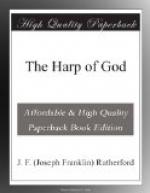[198]It is very important, then, that we understand the meaning of ransom; hence we here define it. Ransom means something to loosen with; that is, a redemptive price. It is the means or price or value which can be used in loosening or releasing something that is in bondage or in restraint or imprisoned. Necessarily the ransom price must be exactly equivalent to, or corresponding with, that which justice requires of the thing or being that is in bondage or imprisonment. Hence we say that ransom means an exact corresponding price. A perfect man sinned and was sentenced to death; hence an exact corresponding price would be the death of another perfect man and the value of that life presented in place of the one who first sinned and was held in bondage.
[199]_Sin-offering_ means the presentation and use of the ransom-price. On the atonement day performed by the Jews in type, the blood of the bullock represented the poured-out life; and therefore it stood for the ransom-price or value of the life. The carrying of the blood into the Most Holy and sprinkling it there pictured the sin-offering, that is, a presentation in the Most Holy (which represented heaven itself) of the value or merit of the perfect life. We will see, therefore, as we examine this question that the ransom-price was provided on earth by the death of Jesus; that preparation for the sin-offering was begun on earth, but must be finished in heaven, where the value of the ransom-price is presented.
[200]Other Scriptures show that it was intended by Jehovah that the great Redeemer should pour out his life in death and that this should constitute the ransom-price, which should be made an offering for sin. God foretold this—which is equivalent to a promise—through his prophet when he wrote concerning the great coming Redeemer the following:
[201]"Who hath believed our report? and to whom is the arm of the Lord revealed? For he shall grow up before him as a tender plant, and as a root out of a dry ground: he hath no form nor comeliness; and when we shall see him, there is no beauty that we should desire him. He is despised and rejected of men; a man of sorrows, and acquainted with grief: and we hid as it were our faces from him; he was despised, and we esteemed him not. Surely he hath borne our griefs and carried our sorrows; yet we did esteem him stricken, smitten of God, and afflicted. But he was wounded for our transgressions, he was bruised for our iniquities: the chastisement of our peace was upon him; and with his stripes we are healed. All we like sheep have gone astray; we have turned every one to his own way; and the Lord hath laid on him the iniquity of us all. He was oppressed, and he was afflicted, yet he opened not his mouth: he is brought as a lamb to the slaughter, and as a sheep before her shearers is dumb, so he openeth not his mouth. He was taken from prison and from judgment: and who shall declare his generation?




